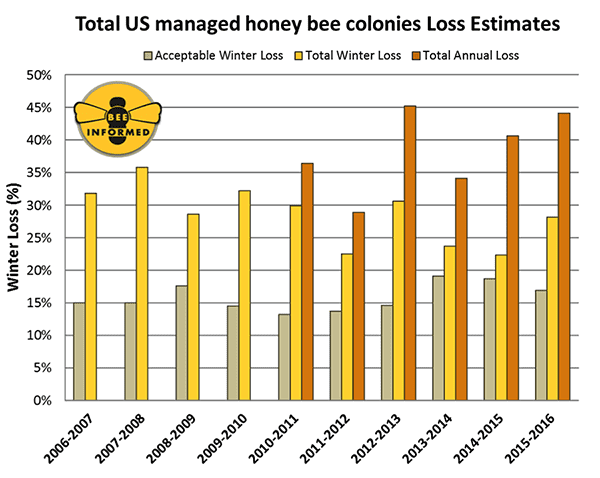Reader Submitted Material
Second year of high rates of honey bee summer loss causing serious concern
U.S. beekeepers lost 44 percent of their honey bee colonies in the 12 months to April 2016, according to the latest preliminary results of an annual nationwide survey. Rates of annual loss including both winter loss and summer loss worsened compared with the previous year. Summer loss rates have now rivaled winter loss rates for the second consecutive survey year, reported the Bee Informed Partnership.
“We’re now in the second year of high rates of summer loss, which is cause for serious concern,” said an assistant professor of entomology at the University of Maryland and project director for the Bee Informed Partnership. “Some winter losses are normal and expected. But the fact that beekeepers are losing bees in the summer, when bees should be at their healthiest, is quite alarming.”
Beekeepers who responded to the survey lost a total of 44.1 percent of their colonies over the course of the year. This marks an increase of 3.5 percent over the previous study year (2014-15), when loss rates were found to be 40.6 percent. Winter loss rates increased from 22.3 percent in the previous winter to 28.1 percent this past winter, while summer loss rates increased from 25.3 percent to 28.1 percent.

Summary of the total overwinter colony losses (October 1 – April 1) of managed honey bee colonies in the United States across nine annual national surveys. The acceptable range is the average percentage of acceptable colony losses declared by the survey participants in each year of the survey. Credit: Bee Informed Partnership/University of Maryland
“The high rate of loss over the entire year means that beekeepers are working overtime to constantly replace their losses,” said a senior entomologist at the USDA and a co-coordinator of the survey. “These losses cost the beekeeper time and money. More importantly, the industry needs these bees to meet the growing demand for pollination services. We urgently need solutions to slow the rate of both winter and summer colony losses.”
Multiple factors are contributing to colony losses including pesticides and malnutrition, especially among commercial colonies. However, the main culprit by far is varroa mite, a deadly parasite that easily spreads between colonies.
Source: Bee Informed Partnership/University of Maryland
Related Links
